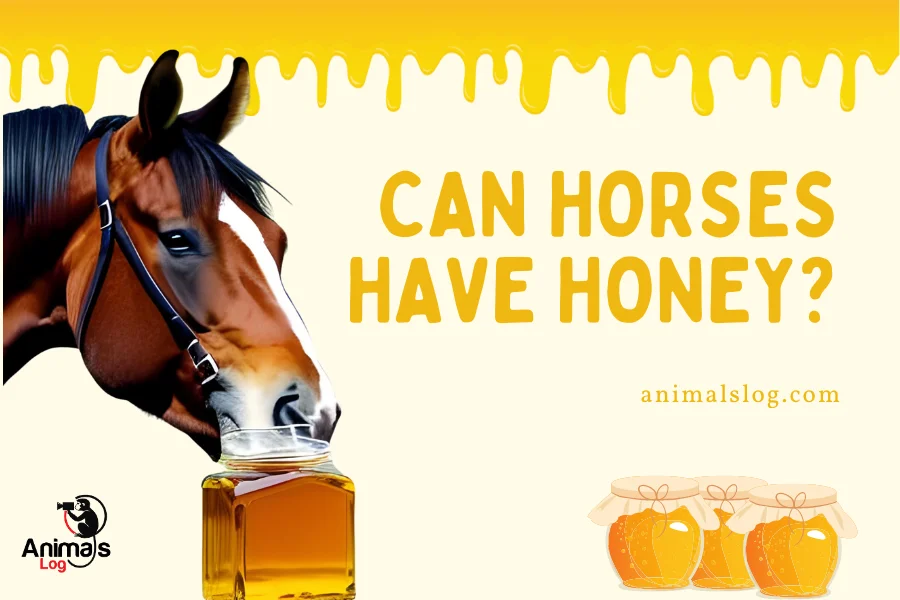Owners frequently have plenty of inquiries about the food preferences of horses. One typical question that comes up is: Can horses have honey? Humans frequently utilize honey, a natural sweetener made from the nectar of flowers. However, it is imperative to comprehend the likely consequences of adding honey to a horse diet in order to make informed decisions.
Horse Dietary & Nutritional Requirements
A balanced diet greatly influences horse fitness and general health. Since they are herbivores, horses have developed a preference for eating forage as the majority of their diet. A horse’s diet should be mostly comprised of high-quality fodder, including hay and grass.
Water is essential for healthy digestion, controlling body temperature, and remaining well-hydrated. On average, a horse should drink between 5 and 10 gallons of water daily. However, this might change based on the climate, degree of exercise, and food.
Carbohydrates, lipids, and proteins in the diet can provide energy. Every horse has different energy requirements, so it is essential to determine what they are and ensure they get enough calories to keep their bodies in good shape. Protein is crucial for the growth of muscles, tissue healing, and many other biological functions.
A balance of the necessary amino acids that horses need can be found in protein-rich foods, including high-quality pasture, lentils, and certain grains. To guarantee that horses eat a diet that is both full and regulated, adequate vitamin and mineral supplements may be required.
Can Horses Have Honey?

Honey is frequently praised for its possible human health advantages, including its antioxidant qualities and soothing impact on sore throats and coughs. However, there is little proof that adding honey to a horse’s diet is good for them. Some horse owners may give their horses love as an alternative to sugar to improve taste or as a supplement for specific uses, such as wound treatment.
Prior to introducing honey or any other new nutritional supplement to your horse’s diet, you should speak with a veterinarian. Horses are herbivores with specialized digestive systems developed to break down fibrous plant matter. Horses do not have the salivary enzyme amylase, which helps in the breakdown of carbohydrates and sugars. As a result, they have a restricted tolerance for diets that are heavy in simple sugars.
Therefore, even though honey is often healthy for human consumption, adding it to a horse’s diet calls for cautious consideration. This is due to honey and its impact on insulin resistance in horses. Horses may experience difficulties due to the high sugar content of honey, which might result in a variety of digestive problems. It is crucial to remember that horses have a relatively low tolerance for sugar, and overindulging can lead to severe and unsettling illnesses like colic and laminitis.
Here are some honey-based treat ideas for feeding honey to senior horses.
- Oats, honey, and a tiny bit of water can be combined to make dough to make honey-oat cookies. These treats offer a combination of carbs, fiber, and honey’s inherently sweet flavor.
- Lick snacks that entertain and stimulate the mind are popular among horses. Some lick treats sold in stores are flavored with honey, which attracts horses.
- You may add a little honey to hay cubes or compressed feed to improve the flavor for horses that like it. Mix the hay cubes thoroughly after adding a tiny amount of honey to them to evenly distribute the flavor.
Horses may like the flavor of treats made with honey, but you should only give them occasionally. To offer a taste without overindulging, think about utilizing tiny portions or cutting the treats into smaller pieces. When offering new meals to the horse, it is critical to see how they behave. Stop using honey-based treats if you notice any negative effects, and get advice from a vet if required.
Recommended Reading | Can Horses Have Strawberries?
Benefits Of Honey To Horses

Although horses’ digestive systems and nutritional needs differ from those of humans, adding honey to their diet may have some advantages.
- The inherent sweetness and pleasing flavor of honey can make horse feed and supplements more palatable. A bit of honey can make some horses who are finicky eaters or have diminished appetites more willing to eat their food.
- The inherent antibacterial and wound-healing properties of honey in humans have long been acknowledged. Similarly, horses’ small wounds, scratches, and sores can be treated topically with honey.
- Honey has long been utilized as a homeopathic treatment for human coughs and respiratory discomfort. As a supplement or component of herbal mixes intended to enhance respiratory health, some horse owners use honey.
- Honey includes carbohydrates that are simple to digest, particularly glucose and fructose, which can give horses a rapid source of energy. Horses might benefit from the readily accessible energy given by honey during strenuous activity or high-performance sports, such as racing or leaping.
- Antioxidants found in honey assist the body in fighting off harmful free radicals and oxidative stress. Antioxidants can help to build a strong immune system and lower the likelihood of inflammation.
To establish the proper amount of honey to add to a horse’s diet, taking into consideration their specific demands, medical history, and general diet, always contact a veterinarian or equine dietitian.
FAQs on Can Horses Have Honey
How much honey can a horse consume?
Around 1 to 2 tablespoons of honey per week is considered optimum for a horse.
What honey can I give to my horse?
You must give natural and raw honey to your horse.
Can diabetic horses have honey?
No. One should avoid feeding honey-based meals to diabetic horses.
Final Thoughts
So, can horses have honey? It is essential to use caution and weigh the possible hazards when adding honey to a horse’s diet. Honey contains a lot of sugar, and eating too much sugar can cause a number of health problems, such as weight gain, metabolic problems, and digestive diseases, including colic and laminitis.







